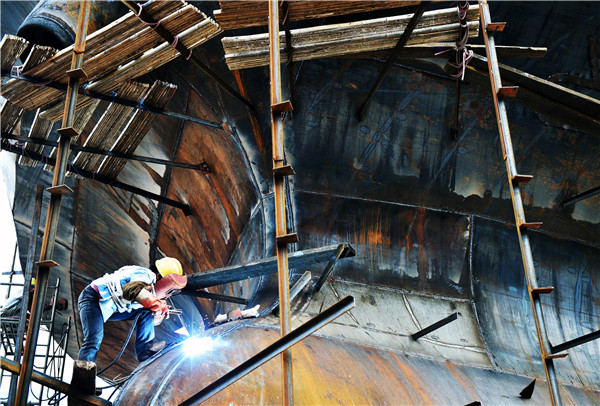 |
|
A female welder at a shipbuilding site in Southwest China's Chongqing.CHINA DAILY |
State shipbuilder acts on oversupply and waning global demand
China Shipbuilding Industry Corp, one of the country's two major shipbuilding conglomerates, plans to integrate six of its shipyards into three. It will focus more on building high-end vessels as the industry remains in choppy waters amid waning global demand.
Officials at the State-owned company said the plan is to simplify its management structure and make itself more proficient in building ships such as very-large crude and ore carriers, bulk carriers, and cement and cattle vessels, which will allow it to diversify its options and broaden its customer base.
With a workforce of about 150,000 employees, CSIC operates more than 50 industrial subsidiaries and 30 research institutes, and has exported various types of vessels to more than 70 countries.
China State Shipbuilding Corp, the country's other State shipbuilding concern, has more than 50 subsidiaries and research institutes.
CSIC's three major subsidiaries are Dalian Shipbuilding Industry Co, Bohai Shipbuilding Heavy Industry Co and Qingdao Wuchuan Heavy Industry Co.
Three major shipyards are involved in the restructuring, Shanhaiguan shipbuilding Industry Co, Tianjin Xingang Shipbuilding Heavy Industry Co and Qingdao Beihai Shipbuilding Heavy Industry Co, and each will be allocated specific types of building contract.
Sun Bo, CSIC's president, said he expected the global shipbuilding market competition to remain fierce long-term, as the industry suffers from falling demand and overcapacity remains high.
More than 30 major shipyards filed for bankruptcy in the past two years, according to the Beijing-based China Association of the National Shipbuilding Industry.
"Many shipyards in China have excess capacity in conventional shipbuilding, but not in building complex and high value-added ships," said Sun.
"Adjusting our product structure, therefore, is a key element (of the integration)."
Dong Liwan, a shipbuilding industry professor at Shanghai Maritime University, said after building cheap bulk carriers and tugboats for more than a decade, it appears CSIC is hoping the shift in focus will allow its smaller shipyards to attract more buyers from new sectors.
"Even though this restructure cannot effectively cut production capacity, under current declining market condition it means these subsidiaries can build more profitable ships and avoid having idle docks," said Dong.
Already the primary contractor for China's navy, CSIC created four finance companies last year, including CSIC Capital Co Ltd, to inject more cash into the operation and improve cash flow.
It also set up an industrial fund with an initial capital of 10 billion yuan ($1.53 billion) to further invest in fields such as offshore engineering products, power, electronic information and intelligent equipment, and underwater defense.
He Jingtong, an economic policy professor at Nankai University in Tianjin, said mergers are an effective method of cutting surplus in oversupplied industries.
"So I am not surprised to see more restructuring going on this year, as the government deploys more resources into State-owned enterprise reform."
